Mercedes-Benz GLK-Class: Service products and capacities
Important safety notes
Service products include the following:
- fuels (e.g. gasoline, diesel)
- lubricants (e.g. engine oil, transmission oil)
- coolant
- brake fluid
- windshield washer fluid
Vehicle components and their respective lubricants must match. You should therefore only use products that have been tested and approved by Mercedes-Benz.
Information on tested and approved products can be obtained at a Mercedes-Benz Center or on the Internet at http://www.mbusa.com (USA only).
![]() WARNING
WARNING
Comply with all valid regulations with respect to handling, storing and disposing of service fluids. Otherwise, you could endanger persons or the environment.
Keep service fluids out of the reach of children.
For health reasons, you should prevent service fluids from coming into direct contact with your skin or clothing. If a service fluid is swallowed, contact a physician immediately.
Capacities
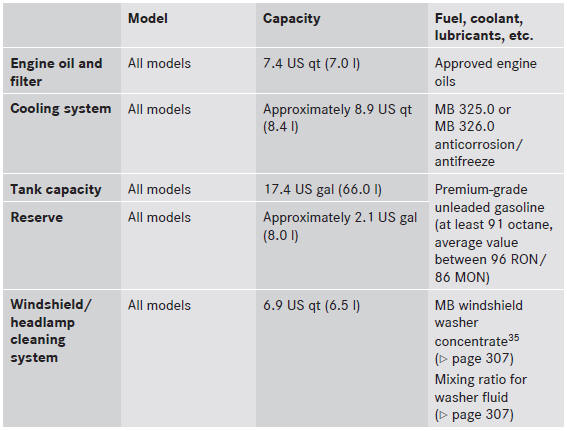
Fuel
Important safety notes
![]() WARNING
WARNING
Gasoline is highly flammable and poisonous. It burns violently and can cause serious personal injury.
Never allow sparks, flames or smoking materials near gasoline.
Turn off the engine before refueling.
Whenever you are around gasoline, avoid inhaling fumes and any skin or clothing contact.
Direct skin contact with fuels and the inhalation of fuel vapors are damaging to your health.
Premium-grade unleaded gasoline
![]() To ensure the longevity and full performance of the engine, only premiumgrade
unleaded gasoline may be used. If there is no premium-grade unleaded gasoline available
and regular-grade unleaded gasoline may be used; please observe the following precautions:
To ensure the longevity and full performance of the engine, only premiumgrade
unleaded gasoline may be used. If there is no premium-grade unleaded gasoline available
and regular-grade unleaded gasoline may be used; please observe the following precautions:
- only fill the fuel tank to half full with regular-grade unleaded gasoline and fill the rest with premium-grade unleaded gasoline as soon as possible.
- do not drive at the maximum speed.
- avoid sudden acceleration.
- if the vehicle is carrying a light load, e.g. two passengers without luggage, do not allow the engine to rev above 3,000 rpm.
- if the vehicle is fully loaded or is being operated in mountainous terrain, do not depress the accelerator pedal further than Ô of the pedal travel.
Fuel requirements
Use only premium-grade unleaded gasoline. The octane number should be at least 91. Details can be found on the gas pump. The octane number is the average value of the Research Octane Number (RON) and the Motor Octane Number (MON): (RON + MON) / 2, also known as knock resistance. Reformulated Gasoline (RFG) and/or unleaded gasoline with additives can be used if the concentration of the additives in the fuel does not exceed 10%, e.g.:
- Ethanol
- TAME
- ETBE
- IPA
- TBA
For MTBE, the concentration should not exceed 15%.
The concentration of methanol in gasoline including other additives must not exceed 3%. Using mixtures of methanol and ethanol is not permitted. Gasohol, a mixture of 10% ethanol and 90% unleaded gasoline, can be used. All of these mix fuels must fulfill the fuel requirements, e.g.:
- knock resistance
- boiling point
- vapor pressure
Additives in gasoline
One of the main problems of poor fuel quality is the forming of deposits that are caused during the gasoline combustion process. Mercedes-Benz recommends that you use fuel brands that have the additives.
If you use fuels without these additives for an extended period of time, there may be a buildup of carbon deposits, especially on the inlet valves and in the combustion chamber. This could lead to engine problems, e.g.:
- longer engine warm-up phase
- uneven idle
- engine noise
- misfiring
- loss of power
Carbon deposits may form if the availability of gasoline with relevant additives is insufficient (in certain regions). In this case, Mercedes-Benz recommends the use of additives that have been approved for Mercedes-Benz vehicles.
Consult an authorized Mercedes-Benz Center or go to the Internet site http://www.mbusa.com (USA only) for a list of approved products. Observe the instructions for use on the product label. Do not mix other fuel additives with fuel. This causes unnecessary costs and could damage the engine.
![]() Do not refuel with low-grade fuel and do not use fuel additives
that are not tested and approved for Mercedes-Benz vehicles. Damage to or malfunctions
of the fuel system may otherwise occur.
Do not refuel with low-grade fuel and do not use fuel additives
that are not tested and approved for Mercedes-Benz vehicles. Damage to or malfunctions
of the fuel system may otherwise occur.
Engine oil
Please bear the following in mind
The engine oils are matched to the performance of Mercedes-Benz engines and service intervals. You should therefore only use engine oils and oil filters that are approved for vehicles with maintenance systems.
For a list of approved engine oils and oil filters, consult an authorized Mercedes-Benz Center or go to the Internet site http://www.mbusa.com (USA only).
![]() Never use engine oil or an oil filter of a specification
other than is necessary to fulfill the prescribed service intervals. Do not change
the engine oil or oil filter in order to achieve longer replacement intervals than
those prescribed. You could otherwise cause engine damage or damage to the exhaust
gas aftertreatment. Follow the instructions in the service interval display regarding
the oil change. Otherwise, you may damage the engine and the exhaust gas aftertreatment.
Never use engine oil or an oil filter of a specification
other than is necessary to fulfill the prescribed service intervals. Do not change
the engine oil or oil filter in order to achieve longer replacement intervals than
those prescribed. You could otherwise cause engine damage or damage to the exhaust
gas aftertreatment. Follow the instructions in the service interval display regarding
the oil change. Otherwise, you may damage the engine and the exhaust gas aftertreatment.
The table shows which engine oils have been approved for your vehicle.
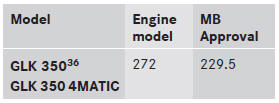
![]() MB approval is indicated on the oil containers.
MB approval is indicated on the oil containers.
Additives
![]() Do not use any additives in the engine oil. This could damage the engine.
Do not use any additives in the engine oil. This could damage the engine.
Engine oil viscosity
Viscosity describes the flow characteristics of a fluid. If an engine oil has a high viscosity, this means that it is thick; a low viscosity means that it is thin.
Select an engine oil with an SAE (viscosity) classification suitable for the prevailing outside temperatures. The following table shows the correct SAE classification to be used. The low-temperature characteristics of engine oils can deteriorate significantly, e.g. as a result of aging, soot and fuel deposits. It is therefore strongly recommended that you carry out regular oil changes using an approved engine oil with the appropriate SAE classification.
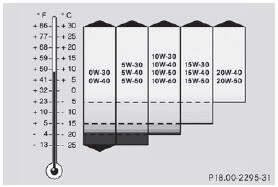
Refrigerant of the air-conditioning system
The air-conditioning system is filled with R134a refrigerant and a special PAG lubricant.
![]() Never use refrigerant R 12 (CFC) or mineral lubricants. Otherwise, you could
damage the air-conditioning system.
Never use refrigerant R 12 (CFC) or mineral lubricants. Otherwise, you could
damage the air-conditioning system.
Brake fluid
![]() WARNING
WARNING
Over a period of time, the brake fluid absorbs moisture from the air; this lowers its boiling point.
If the boiling point of the brake fluid is too low, vapor pockets may form in the brake system when the brakes are applied hard (e.g. when driving downhill). This would impair braking efficiency.
You should have the brake fluid renewed at regular intervals. The brake fluid change intervals can be found in the Service Booklet. Only use brake fluid approved by Mercedes- Benz. Information about approved brake fluids can be obtained from any authorized Mercedes-Benz Center or on the Internet at http://bevo.mercedes-benz.com.
Coolant
Important safety notes
The coolant is a mixture of water and antifreeze/corrosion inhibitor. It performs the following tasks:
- corrosion protection
- antifreeze protection
- raising the boiling point
The engine cooling system is filled at the factory with coolant that contains an antifreeze/corrosion inhibitor that ensures protection down to approximately -35 F (-37 C).
![]() Only add coolant that has been premixed with the desired antifreeze protection.
Otherwise, the engine could be damaged. Further information on coolants and on filling
can be found in the Mercedes-Benz Specifications for Service Products, MB Approval
310.1, e.g. on the Internet at http://bevo.mercedes-benz.com. You can also consult
an authorized Mercedes-Benz Center.
Only add coolant that has been premixed with the desired antifreeze protection.
Otherwise, the engine could be damaged. Further information on coolants and on filling
can be found in the Mercedes-Benz Specifications for Service Products, MB Approval
310.1, e.g. on the Internet at http://bevo.mercedes-benz.com. You can also consult
an authorized Mercedes-Benz Center.
![]() Always use a suitable coolant mixture, even in countries where high temperatures
prevail.
Always use a suitable coolant mixture, even in countries where high temperatures
prevail.
Otherwise, the engine cooling system is not sufficiently protected from corrosion and overheating.
If the coolant has antifreeze protection down to -35 F (-37 C), the boiling point of the coolant under operating conditions is approximately 266 F (130 C).
Your vehicle has a range of aluminum components. Aluminum components in the engine make it necessary to use antifreeze/ corrosion inhibitor coolant that has been specifically formulated to protect the aluminum parts. Using other antifreeze/ corrosion inhibitors without these characteristics affects the service life.
The coolant must be used throughout the year in order to maintain the necessary corrosion protection and to provide protection from overheating. In the Service Booklet, you can find information on the intervals for renewal. The renewal interval is determined by the coolant type and the engine cooling system design. The renewal interval in the Service Booklet is only valid if the coolant is renewed or filled up with Mercedes-Benz approved products. Therefore, only use MB 325.0 or 326.0 anticorrosion/antifreeze or another Mercedes-Benz approved product of the same specification.
Information on other products with the same specifications that are approved by Mercedes-Benz can be obtained at an authorized Mercedes-Benz Center or on the Internet at http://bevo.mercedes-benz.com. The coolant is checked at every maintenance interval at an authorized Mercedes-Benz Center.
The antifreeze/corrosion inhibitor concentration in the engine cooling system should:
- be at least 50%. This will protect the engine cooling system against freezing down to approximately -35 F (-37 C ).
- not exceed 55% (antifreeze protection to -49 F [-45 C ]); otherwise, heat will not dissipate as effectively.
If the coolant level is too low, MB 325.0 or 326.0 anticorrosion/antifreeze should be added. Have the engine cooling system checked for possible leaks.
Windshield/headlamp cleaning system
![]() WARNING
WARNING
Washer solvent/antifreeze is highly flammable. Do not spill washer solvent/ antifreeze on hot engine parts, because it may ignite and burn. You could be seriously burned.
Use MB SummerFit windshield washer concentrate at temperatures above freezing:
- Mix 1 part MB SummerFit with 100 parts water.
Use MB WinterFit windshield washer concentrate at temperatures below freezing:
- At temperatures down to 14 ‡(Ò 10 †): mix 1 part MB WinterFit with 2 parts water.
- At temperatures down to Ò 4 ‡(Ò 20 †): mix 1 part MB WinterFit with 1 part water.
- At temperatures down to Ò 20.2 ‡(Ò 29 †): mix 2 parts MB WinterFit with 1 part water.
![]() Only SummerFit and WinterFit can be mixed. Otherwise, the jets could become
blocked.
Only SummerFit and WinterFit can be mixed. Otherwise, the jets could become
blocked.
Vehicle data
For the specified vehicle data, please note that:
- The heights specified may vary due to:
- tires
- load
- condition of the suspension
- optional equipment
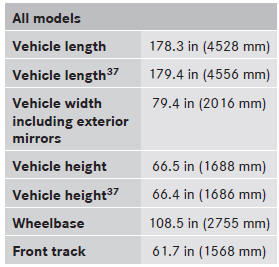
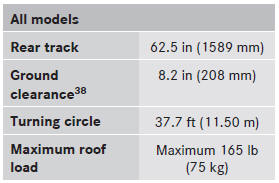
See also:
Warning lights and chimes
Base instrument cluster shown in standard measure. Metric similar.
Optional instrument cluster shown in standard measure. Metric
similar.
Warning lights and gauges can alert you to a vehicle condition that may
become serious enough to cause e ...
Tires and wheels
Tires care For proper maintenance, safety, and maximum fuel economy, you must
always maintain recommended tire inflation pressures and stay within the load limits
and weight distribution recommended for your vehicle. Inflation pressures All tire ...

 Identification plates
Identification plates